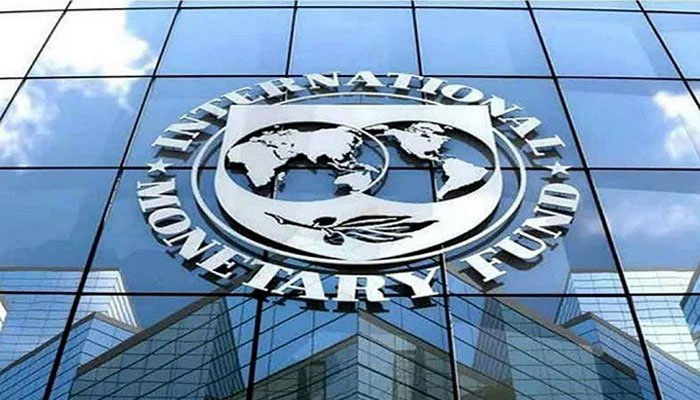GDP forecast unchanged: IMF warns inflation, current account to remain near-term risks
IMF expects the CAD to rise to 5.3 percent of GDP by end-June 2022, from a previous forecast of 4.1 percent
ISLAMABAD: The International Monetary Fund (IMF) kept its growth forecast for Pakistan unchanged at 4 percent for fiscal year 2022, though it noted that near-term risks from rising inflation and a changing external environment had increased and sharply revised the Fund’s projections for the country’s current account deficit and inflation.
It now expects the current account deficit to rise to 5.3 percent of GDP by end-June 2022, from a previous forecast of 4.1 percent, mainly due to imports of oil and commodities. In the World Economic Outlook released in Washington, the IMF projected Pakistan’s current account deficit to hit $18.5 billion this fiscal year. Previously the Fund had projected a deficit of $12.9 billion for FY2022.
The Fund estimates that Pakistan requires gross external financing of over $35 billion in the current fiscal year on current account deficit of 5.3 percent of GDP in FY2022.
The IMF also raised its inflation forecasts for Pakistan to 12.7 percent on an average for the current fiscal from previous projection of 9.4 percent. The CPI inflation stood at 12.7 percent in March 2022.
“The price pressures have prompted central banks in many countries to begin to raise interest rates to tamp down inflation, but that will hurt highly indebted developing nations,” the report said.
Former premier Imran Khan had announced a cut in petrol and electricity tariffs in February, despite soaring global prices, to help mitigate the impact of rising energy prices, particularly those at the petrol pump. The new Shehbaz Sharif government has decided not to roll back billions in fuel subsidies for the time being.
Analysts, however, say the fuel and electricity subsidies are only adding more stress to fiscal position. Dr Khaqan Najeeb, former advisor to finance ministry, said current account deficit was a key cause of macroeconomic instability for a country like Pakistan with scarce foreign exchange.
“The current account deficit has grown way beyond initial forecasts. It is needless to say that deficit of above 5 percent of GDP is not a sustainable level,” Najeeb said. “A higher current account deficit has raised the requirement of external gross financing needs for Pakistan beyond $34 billion.”
Former advisor also showed concern on an upward revision of inflation both by authorities and multilateral partners and said managing inflation beyond monetary tightening is a key challenge for the government to give relief to the people. “Real hard work is required, as both a higher current account deficit and rise in inflation require stronger adjustment measures to bring back to sustainable levels,” Dr Najeeb said.
-
 Eric Dane's Girlfriend Janell Shirtcliff Pays Him Emotional Tribute After ALS Death
Eric Dane's Girlfriend Janell Shirtcliff Pays Him Emotional Tribute After ALS Death -
 King Charles Faces ‘stuff Of The Nightmares’ Over Jarring Issue
King Charles Faces ‘stuff Of The Nightmares’ Over Jarring Issue -
 Sarah Ferguson Has ‘no Remorse’ Over Jeffrey Epstein Friendship
Sarah Ferguson Has ‘no Remorse’ Over Jeffrey Epstein Friendship -
 A$AP Rocky Throws Rihanna Surprise Birthday Dinner On Turning 38
A$AP Rocky Throws Rihanna Surprise Birthday Dinner On Turning 38 -
 Andrew Jokes In Hold As BAFTA Welcomes Prince William
Andrew Jokes In Hold As BAFTA Welcomes Prince William -
 Sam Levinson Donates $27K To Eric Dane Family Fund After Actor’s Death
Sam Levinson Donates $27K To Eric Dane Family Fund After Actor’s Death -
 Savannah Guthrie Mother Case: Police Block Activist Mom Group Efforts To Search For Missing Nancy Over Permission Row
Savannah Guthrie Mother Case: Police Block Activist Mom Group Efforts To Search For Missing Nancy Over Permission Row -
 Dove Cameron Calls '56 Days' Casting 'Hollywood Fever Dream'
Dove Cameron Calls '56 Days' Casting 'Hollywood Fever Dream' -
 Prince William, Kate Middleton ‘carrying Weight’ Of Reputation In Epstein Scandal
Prince William, Kate Middleton ‘carrying Weight’ Of Reputation In Epstein Scandal -
 Timothée Chalamet Compares 'Dune: Part Three' With Iconic Films 'Interstellar', 'The Dark Knight' & 'Apocalypse Now'
Timothée Chalamet Compares 'Dune: Part Three' With Iconic Films 'Interstellar', 'The Dark Knight' & 'Apocalypse Now' -
 Little Mix Star Leigh-Anne Pinnock Talks About Protecting Her Children From Social Media
Little Mix Star Leigh-Anne Pinnock Talks About Protecting Her Children From Social Media -
 Ghislaine Maxwell Is ‘fall Guy’ For Jeffrey Epstein, Claims Brother
Ghislaine Maxwell Is ‘fall Guy’ For Jeffrey Epstein, Claims Brother -
 Timothee Chalamet Rejects Fame Linked To Kardashian Reality TV World While Dating Kylie Jenner
Timothee Chalamet Rejects Fame Linked To Kardashian Reality TV World While Dating Kylie Jenner -
 Sarah Chalke Recalls Backlash To 'Roseanne' Casting
Sarah Chalke Recalls Backlash To 'Roseanne' Casting -
 Pamela Anderson, David Hasselhoff's Return To Reimagined Version Of 'Baywatch' Confirmed By Star
Pamela Anderson, David Hasselhoff's Return To Reimagined Version Of 'Baywatch' Confirmed By Star -
 Willie Colón, Salsa Legend, Dies At 75
Willie Colón, Salsa Legend, Dies At 75




